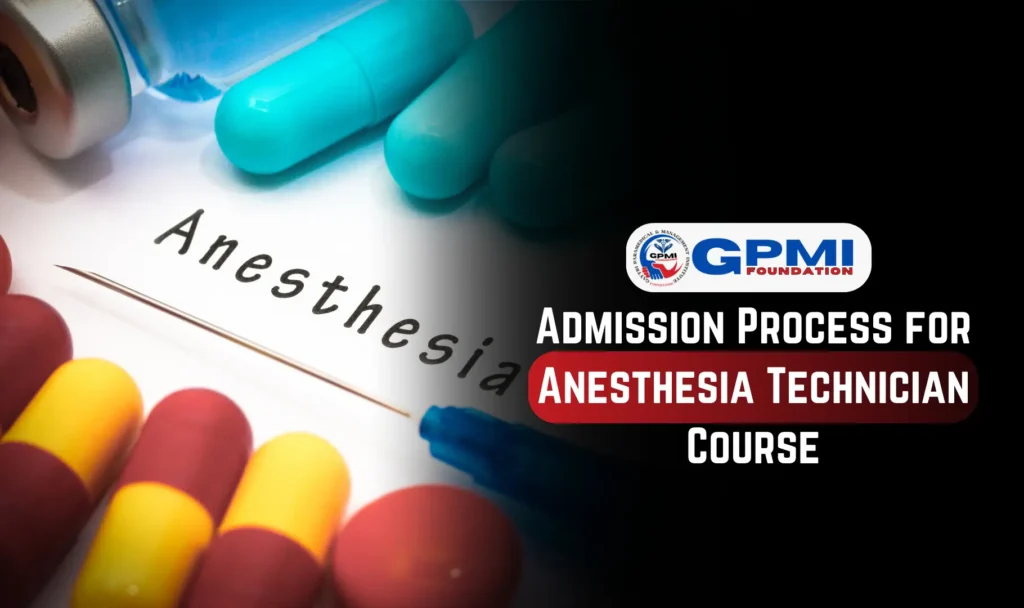Anesthesia technicians play a vital role in healthcare by assisting anesthesiologists during surgeries and medical procedures. They help prepare and maintain anesthesia equipment, ensure medications and instruments are ready, and monitor machines during operations. Their work is crucial for patient safety and the smooth running of surgeries.
The Anesthesia Technician Course trains students in both theory and practical skills. Students learn about different types of anesthesia, how to handle machines, safety procedures, and emergency protocols. Hands-on training in hospitals gives them real-life experience, preparing them for professional challenges.
This course is suitable for students who have completed 12th standard (Science) and want a career in healthcare. It provides a strong foundation for working in hospitals, clinics, and surgical centers. With growing demand for trained technicians, this course offers good career opportunities and professional growth.
In short, the Anesthesia Technician Course equips students with the knowledge and skills to assist doctors effectively, ensure patient safety, and build a rewarding career in healthcare.
Table of Contents
Eligibility Criteria for Anesthesia Technician Course
To pursue an Anesthesia Technician Course, students must meet certain educational requirements. Generally, candidates should have completed their 12th standard in Science with subjects like Physics, Chemistry, and Biology. Some institutes may also accept students from Medical or Paramedical streams. Good knowledge of basic science is important because the course involves understanding human anatomy, anesthesia principles, and medical equipment.
Apart from educational qualifications, there may be age limits set by some colleges, usually ranging from 17 to 25 years. Admission requirements can vary depending on the institute. Some colleges offer direct admission, while others may require candidates to pass an entrance exam or an interview. It is important to check the specific criteria of the college before applying.
In short, students who have completed 12th science and meet the institute’s age and admission requirements can enroll in the course. Meeting these eligibility criteria ensures that students are prepared for the technical and practical challenges of the program.
Duration and Course Structure
The Anesthesia Technician Course usually lasts for 1 to 2 years, depending on the institute and program type. Some colleges offer a diploma, while others provide a certificate or degree program. During this period, students gain both theoretical knowledge and practical skills needed to work in healthcare settings.
The course syllabus covers important subjects such as anesthesia equipment handling, patient monitoring, human anatomy, safety protocols, and emergency procedures. Students also learn about different types of anesthesia, medications, and how to prepare the operation theater for surgeries.
A key part of the course is practical training and internships. Students get hands-on experience in hospitals, clinics, and surgical centers. This real-world exposure helps them understand how to assist anesthesiologists, manage equipment, and respond to emergencies efficiently.
In short, the course structure balances theory and practice, giving students the knowledge and confidence to start a professional career as an anesthesia technician.
Admission Process for Anesthesia Technician Course

The admission process for an Anesthesia Technician Course is usually simple, but it can vary depending on the college. Most institutes accept students who meet the eligibility criteria of completing 12th Science. Some colleges offer direct admission, while others may require candidates to appear for an entrance exam or attend an interview.
To apply, students generally need to fill out an application form online or offline and submit required documents such as mark sheets, identity proof, and photographs. It is important to check the deadlines and admission schedule of the chosen institute to avoid missing out.
Some institutes also conduct counseling sessions to guide students on course selection, fees, and career options. After completing all formalities, selected candidates are enrolled in the program and can begin their training.
In short, understanding the admission process helps students plan their enrollment smoothly and start their journey toward becoming a skilled anesthesia technician.
Skills Required to Become an Anesthesia Technician
To be a successful anesthesia technician, students need a combination of technical skills and personal qualities. They should be familiar with anesthesia machines, monitoring equipment, and medical instruments. Understanding how these tools work and maintaining them properly is a key part of the job.
Attention to detail and accuracy are essential because even small mistakes can affect a patient’s safety during surgery. Good observation and problem-solving skills help technicians respond quickly in emergencies.
Besides technical knowledge, anesthesia technicians must have strong communication and teamwork skills. They work closely with anesthesiologists, surgeons, and nurses, so being able to follow instructions and cooperate in high-pressure situations is important. Patience, responsibility, and a caring attitude toward patients are also highly valued in this field.
In short, a combination of technical expertise, focus, and personal qualities prepares students to perform their duties efficiently and succeed as professional anesthesia technicians.
Top Colleges and Institutes Offering Anesthesia Technician Course in India
India has many reputed colleges and institutes that offer the Anesthesia Technician Course with high-quality education and excellent practical exposure. These institutes focus on building both the technical and clinical skills needed for success in the healthcare industry. Students get the chance to learn from experienced faculty, work with modern anesthesia equipment, and train in well-equipped operation theaters.
The course is available in different formats such as Diploma, Certificate, and Degree programs, giving students the flexibility to choose based on their goals and qualifications. The Diploma in Anesthesia Technology is one of the most popular options and is ideal for students who want to start working soon after 12th Science. On the other hand, a Bachelor’s degree in Anesthesia Technology offers deeper knowledge and can lead to higher positions in hospitals or teaching institutions.
Many top government and private colleges across India offer this course. Some well-known cities for medical and paramedical education include Delhi, Mumbai, Chennai, Bangalore, Pune, Lucknow, and Hyderabad. Government medical colleges usually have lower fees but limited seats, while private institutes may charge higher fees, ranging from INR 50,000 to 2,00,000 per year, depending on the facilities and reputation of the college.
When selecting a college, students should carefully check for recognition and affiliation with universities or health councils. Accreditation ensures that the course is valid and accepted across hospitals in India and abroad. Students should also consider factors such as faculty experience, infrastructure, internship opportunities, and placement support before making a final choice.
Some institutes have tie-ups with reputed hospitals, allowing students to complete their internship training in real clinical environments. This exposure helps them gain confidence and practical knowledge of anesthesia procedures, patient monitoring, and operation theater management.
In short, choosing the right institute is the first and most important step toward building a successful career in anesthesia technology. A good college not only provides quality education but also opens doors to internships, job placements, and long-term professional growth in the healthcare field.
Career Opportunities After Anesthesia Technician Course

After completing the Anesthesia Technician Course, students can explore a wide range of career opportunities in the healthcare and medical industry. Anesthesia technicians are an essential part of every surgical team. They assist anesthesiologists before, during, and after surgeries to ensure that the patient remains safe and comfortable throughout the procedure.
Graduates can find employment in various healthcare settings such as government and private hospitals, surgical centers, trauma care units, nursing homes, diagnostic centers, and emergency care units. They are also needed in medical colleges and research laboratories, where they help in anesthesia-related training and research work.
There are several job profiles available for students after completing this course. Some of the most popular roles include:
- Anesthesia Technician – Assists anesthesiologists in preparing and maintaining anesthesia equipment and monitoring patients during surgery.
- Operation Theater (OT) Technician – Works in the operation room, ensuring that all equipment and surgical instruments are sterilized and ready for use.
- ICU Technician – Manages critical care equipment in intensive care units and supports doctors in patient monitoring.
- Clinical Assistant – Provides support during medical examinations and assists with pre-operative and post-operative patient care.
- Medical Equipment Technician – Responsible for maintaining and calibrating anesthesia and monitoring equipment.
With experience and advanced skills, professionals can move into senior positions such as Senior Anesthesia Technician, Anesthesia Technologist, or Operation Theater Manager. Some also choose to pursue higher education like B.Sc. or M.Sc. in Anesthesia Technology, which can open doors to teaching, research, or administrative roles.
The salary for anesthesia technicians varies depending on qualifications, experience, and the type of healthcare institution. A fresher can expect to earn around INR 15,000 to 25,000 per month, while experienced professionals in reputed hospitals can earn INR 40,000 to 60,000 per month or more. Those working abroad may receive even higher pay due to international demand for skilled paramedical staff.
Apart from hospitals, there is a growing need for anesthesia technicians in private surgical clinics, pain management centers, and emergency medical services (EMS). As healthcare technology advances, new career paths are opening up in medical device companies, training institutes, and health research organizations.
In short, the Anesthesia Technician Course not only provides stable and respectable employment but also offers long-term career growth, skill development, and financial stability. It’s a profession that allows you to contribute directly to patient safety, work alongside top medical professionals, and play an important role in successful surgeries.
Future Scope of Anesthesia Technician in 2026 and Beyond
The demand for anesthesia technicians is expected to grow significantly in the coming years. With the expansion of hospitals, clinics, and surgical centers across India, more trained professionals will be needed to support anesthesiologists and ensure patient safety during surgeries.
Technicians who gain experience and additional certifications can advance to senior roles, specialize in areas like cardiac or neuro-anesthesia, or even work in medical equipment management. Opportunities also exist in medical research, healthcare training institutes, and abroad, especially in countries with advanced healthcare systems.
Continuous learning and skill development can further enhance career prospects. As technology in anesthesia evolves, technicians who stay updated with modern machines and safety protocols will be highly valued.
In short, a career as an anesthesia technician offers long-term stability, growth, and the chance to make a real difference in patient care, making it a promising choice for students in 2026 and beyond.
Why Choose Anesthesia Technician Course as a Career?

Choosing the Anesthesia Technician Course is a smart decision for students who want a career that combines medical knowledge, technical skills, and the satisfaction of helping others. This course allows you to work closely with doctors and patients, playing a vital role in surgeries and emergency care.
One of the main benefits of this course is its strong job demand. Every hospital and surgical center needs skilled anesthesia technicians to assist anesthesiologists. The growing number of healthcare facilities in India ensures that trained professionals will always have opportunities for employment.
This career also offers good salary packages, career stability, and growth opportunities. With experience, you can move into senior positions, work abroad, or continue higher studies in the medical field. Most importantly, it gives you the pride of contributing to patient safety and successful medical treatments.
In short, becoming an anesthesia technician is a rewarding and respected profession that provides job security, continuous learning, and the chance to make a positive impact in healthcare.
Frequently Asked Questions (FAQs) About Anesthesia Technician Course
1. What is the Anesthesia Technician Course?
The Anesthesia Technician Course is a paramedical program that trains students to assist anesthesiologists during surgeries. It covers topics like anesthesia procedures, patient monitoring, and operation theater management. Students also get hands-on experience working with anesthesia machines and surgical instruments.
2. What is the duration of the Anesthesia Technician Course?
The duration depends on the type of program.
- Diploma Course: 1 to 2 years
- Degree (B.Sc. Anesthesia Technology): 3 years
- Certificate Course: 6 months to 1 year
Each program includes both classroom study and hospital-based practical training.
3. What are the eligibility criteria for admission?
Students must have completed their 12th standard with Science stream (Physics, Chemistry, and Biology) from a recognized board. Some institutes may also have age limits (17–25 years) and conduct entrance exams or interviews for admission.
4. What subjects are taught in the Anesthesia Technician Course?
Common subjects include human anatomy, physiology, pharmacology, anesthesia techniques, patient care, operation theater management, and emergency procedures. Students also learn about different types of anesthesia and how to handle anesthesia equipment safely.
5. What are the career options after completing the course?
After completing the course, students can work as Anesthesia Technicians, OT Technicians, ICU Technicians, Clinical Assistants, or Medical Equipment Technicians in hospitals, clinics, and healthcare centers. With experience, they can move into senior roles or specialize in areas like cardiac anesthesia or critical care.
6. What is the average salary of an anesthesia technician in India?
A fresher anesthesia technician can earn around ₹15,000 to ₹25,000 per month. With experience, the salary can rise to ₹40,000 to ₹60,000 per month. Those who gain additional certifications or work abroad can earn even higher salaries.
7. Is an anesthesia technician a good career option?
Yes, it is a highly respected and growing career in the healthcare field. With the rise in medical facilities and surgical procedures, the demand for skilled anesthesia technicians is increasing. It offers good salary, job stability, and the satisfaction of helping patients during critical moments.
8. Can I work abroad after completing this course in India?
Yes. Many countries have a shortage of trained anesthesia technicians. After gaining experience and completing necessary certifications, Indian students can apply for jobs in countries like UAE, UK, Canada, and Australia.
9. What are the top skills required to succeed as an anesthesia technician?
Important skills include technical knowledge of anesthesia machines, attention to detail, teamwork, communication skills, problem-solving ability, and patience. These help technicians perform safely and efficiently during surgeries.
10. Where can I study the Anesthesia Technician Course in India?
Several reputed government and private colleges offer this course across India. Students should choose institutes that are recognized, have good hospital tie-ups, and provide practical training for better career opportunities.
11. Can I do this course after 10th?
No, you need to complete 12th standard in Science to be eligible for most anesthesia technician courses. However, after 10th, you can join paramedical foundation courses and then move to anesthesia technician training later.
12. Is there any future growth in this profession?
Absolutely! With the continuous expansion of hospitals, clinics, and advanced medical technologies, the future scope of anesthesia technicians in 2026 and beyond is very bright. Trained professionals will always be in demand, both in India and internationally.
Conclusion
The Anesthesia Technician Course is one of the most promising and practical career options for students interested in the healthcare field. It offers a perfect blend of theoretical knowledge and hands-on training, preparing students to work confidently in hospitals and surgical units.
With the rising need for skilled professionals in the medical industry, the demand for qualified anesthesia technicians continues to grow every year. This career not only provides job stability and growth but also gives individuals the opportunity to contribute to life-saving medical procedures.
Students who have completed their 12th standard in Science and are passionate about patient care can find this course an excellent choice for a bright future. By gaining the right education and training, one can build a successful, respected, and fulfilling career in the healthcare sector.
If you are looking to start a meaningful career in the medical field, the Anesthesia Technician Course could be your first step toward a rewarding professional journey.






